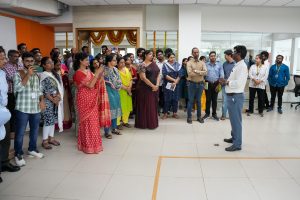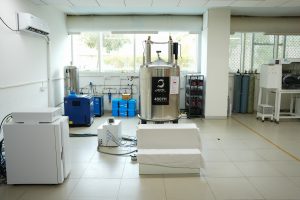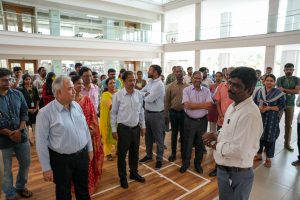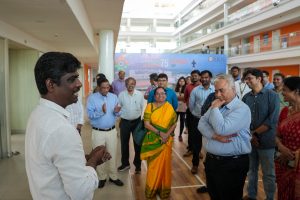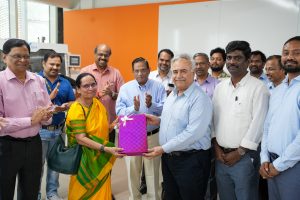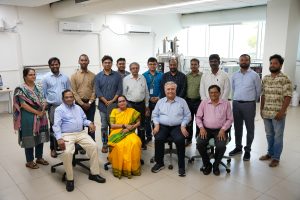Recent News
- Dr Chinmoy Das’s Groundbreaking Research Unveils Promising Discoveries June 26, 2024
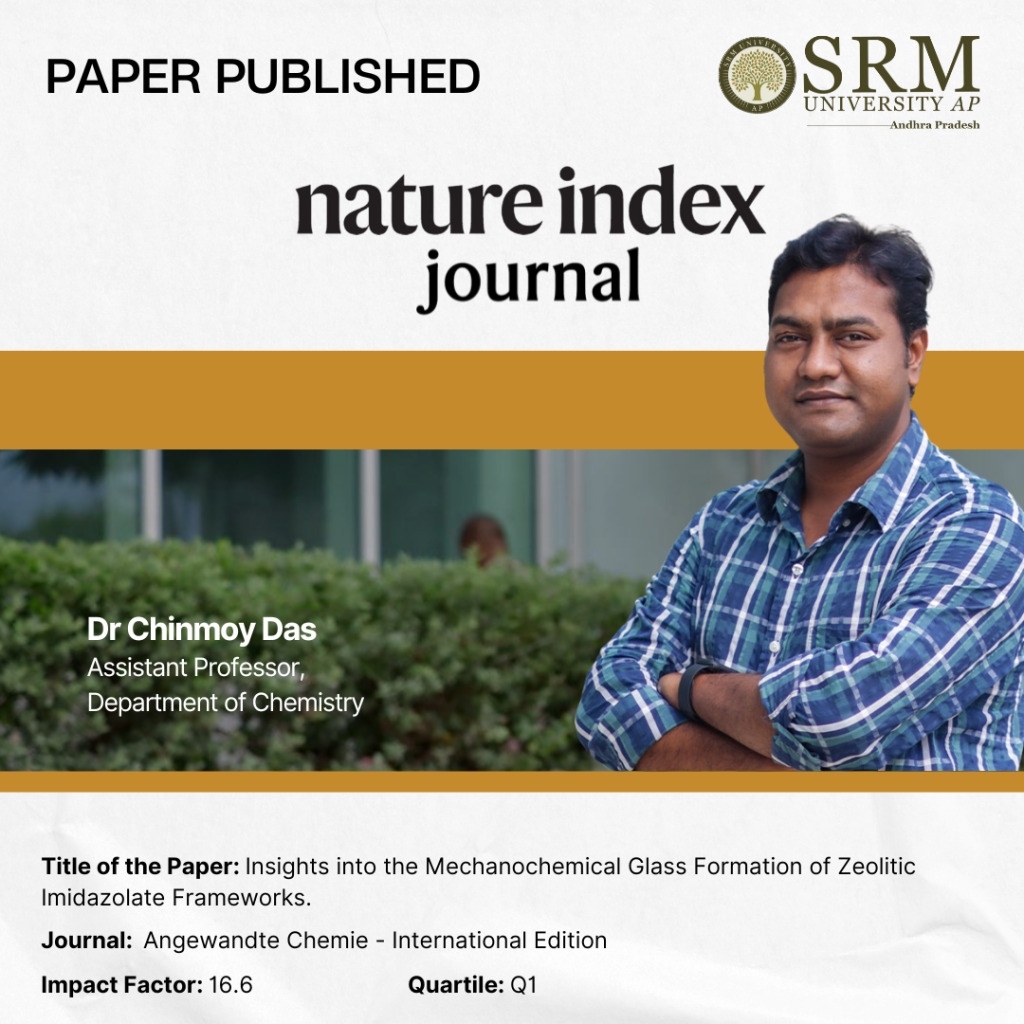
Dr Chinmoy Das, Assistant Professor at the Department of Chemistry at SRM University-AP, has made an impactful contribution with the publication of his research paper, “Insights into the Mechanochemical Glass Formation of Zeolitic Imidazolate Frameworks” in the prestigious Angewandte Chemie International Edition with an impact factor of 16.6. His paper unveils a rapid, eco-friendly, and efficient mechanochemical approach to transform glasses from their crystalline zeolitic imidazolate frameworks. This pioneering work opens new doors for sustainable and effective glass formation, showcasing the power of innovation in the field of chemistry.
Abstract:
We describe a rapid, ecofriendly, and efficient mechanochemical approach to transform glasses from their crystalline zeolitic imidazolate frameworks (ZIFs). We exposition mechanochemical technique through which the traditional melt-quench preparation of glassy phases can be replaced. In this study, we explore that Zn(II), Co(II), and Cu(II)- based crystalline ZIFs transformed into the glassy phases within five minutes through the mechanical ball milling technique. The appearance of glass transition temperature(T g ) upon mechanical milling of crystalline states demonstrated by different characterization techniques, such as X-ray powder diffraction (XRPD), differential scanning calorimetry (DSC), simultaneous thermogravimetric and differential thermal analyses (TG/DTA), scanning electron microscopy (SEM), X-ray total scattering and its deduced pair distribution functions (PDFs). We characterized the porosity and density of the glassy phases through CO 2 gas sorption techniques which aligned with the observation of thermal, structural, and textural features of the ZIFs after varying ball milling times beyond five minutes.
Practical implementation
We can prepare bulk ZIF glasses within five minutes of the mechanochemical approach that will guide the greater feasibility to produce the glass materials for industrial implications. In addition, the greater the accessibility of glassy materials, the greater the fabrication of glassy materials-based device fabrication.
Collaborations
This article has been published with the collaboration of Prof. Sebastian Henke (Henke Group), Department of Chemistry and Chemical Biology, TU Dortmund University, Dortmund, Germany.
Future Research Plans
Recently, we established our research group in SRM University-AP, and our group has started to explore an emergent research area of crystal-glass composite materials towards the applications of atmospheric water harvesting, solid-state electrolytes (Alkali and Alkaline metal ions-based), photovoltaics, and conversion of gaseous Carbon-dioxide molecules to industrially relevant liquids, such as methanol or ethanol.
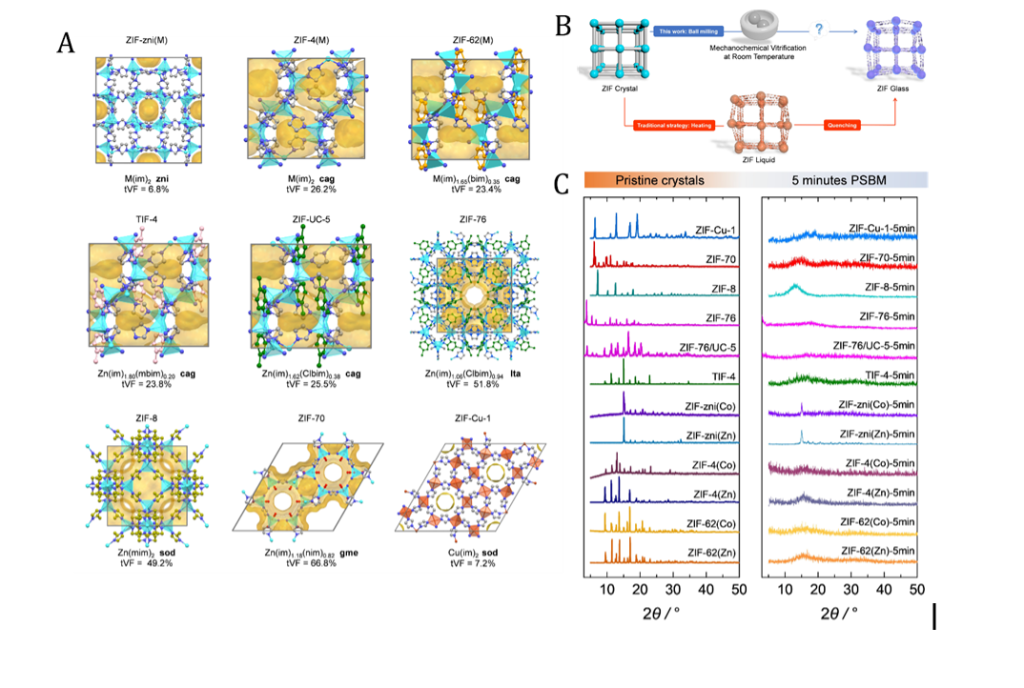
- Figure 1. (A) Single crystal structures of various ZIFs indicated in the figure. (B) Schematic representation of the traditional route to ZIF glass formation (red line) and the mechanochemical vitrification approach followed in this work (blue line). (C) PXRD patterns of the pristine ZIF polycrystalline materials and after five minutes of mechanical ball milling.
Continue reading → - Significant Advancement in Analytical Detection of NFZ by the Department of Chemistry and RARE Lab June 13, 2024
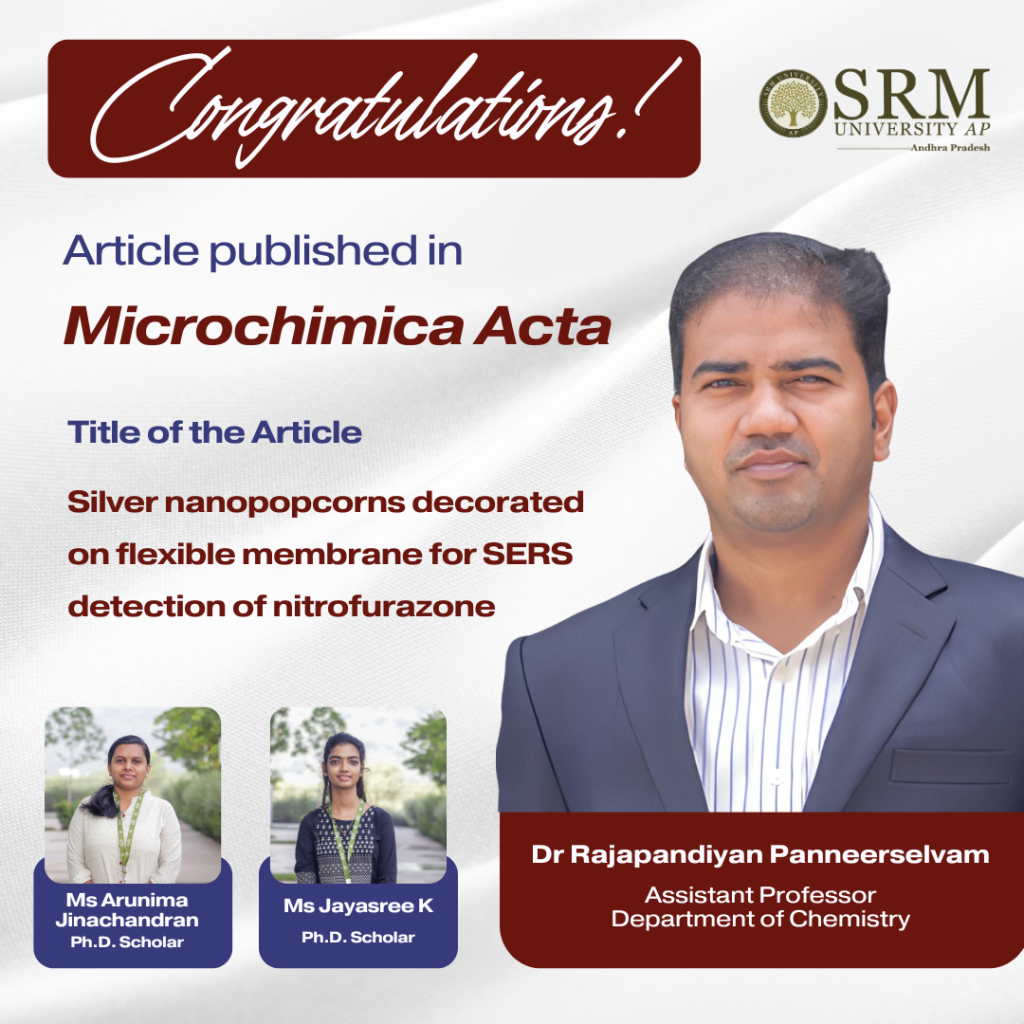
The Department of Chemistry and RARE Lab are excited to announce a groundbreaking advancement in the field of analytical detection. Researchers Dr Rajapandiyan Panneerselvan, Asst. Professor and Ph.D scholars, Ms Arunima Jinachandran and Ms Jayasree Kumar have developed a novel method for detecting nitrofurazone (NFZ) using three-dimensional silver nanopopcorns (Ag NPCs) on a flexible polycarbonate membrane (PCM) in their paper “Silver nanopopcorns decorated on flexible membrane for SERS detection of nitrofurazone” published in Microchimica Acta. This innovative technique leverages the power of surface-enhanced Raman spectroscopy (SERS) to provide a highly sensitive and practical solution for detecting NFZ on various surfaces, including fish.
Nitrofurazone (NFZ) is an antibiotic commonly used in veterinary medicine that poses significant health risks if residues enter the food chain. Despite regulatory bans, its illegal use continues, necessitating highly sensitive detection methods. While effective, traditional methods such as high-performance liquid chromatography and mass spectrometry are often costly and labor-intensive. The new SERS-based method offers a more efficient and straightforward alternative.
Abstract
The synthesis of three-dimensional silver nanopopcorns (Ag NPCs) onto a flexible polycarbonate membrane (PCM) for the detection of nitrofurazone (NFZ) on fish surfaces by surface-enhanced Raman spectroscopy (SERS) is presented. The proposed flexible Ag-NPCs/PCM SERS substrate exhibits significant Raman signal intensity enhancement with a measured enhancement factor of 2.36 × 10^6. This enhancement is primarily attributed to the hotspots created on Ag NPCs, which include numerous nanoscale protrusions and internal crevices distributed across the surface. The detection of NFZ using this flexible SERS substrate demonstrates a low limit of detection (LOD) of 3.7 × 10^−9 M and uniform, reproducible Raman signal intensities with a relative standard deviation below 8.34%. The substrate also exhibits excellent stability, retaining 70% of its efficacy even after 10 days of storage. Notably, the practical detection of NFZ in tap water, honey water, and fish surfaces achieves LOD values of 1.35 × 10^−8 M, 5.76 × 10^−7 M, and 3.61 × 10^−8 M, respectively, highlighting its effectiveness across different sample types. The developed Ag-NPCs/PCM SERS substrate presents promising potential for the sensitive SERS detection of toxic substances in real-world samples.
Methodology
The synthesis involves creating silver nanopopcorns on a flexible polycarbonate membrane using a simple chemical method. The resulting Ag NPCs exhibit high surface roughness with numerous nanoscale features that enhance the Raman signal. This flexible substrate can easily collect samples from irregular surfaces without requiring extensive preparation.
This SERS substrate can detect NFZ in various real-world samples, including:
- Tap water
- Honey water
- Fish surfaces
The method’s sensitivity and ease of use make it a promising tool for ensuring food safety and monitoring environmental contaminants.
The Department believes this development will significantly impact public health by providing a reliable and accessible method for detecting harmful substances in the food chain.
Continue reading → - Dr Chimoy Das’ Research Makes Latest Breakthrough in Material Science May 1, 2024
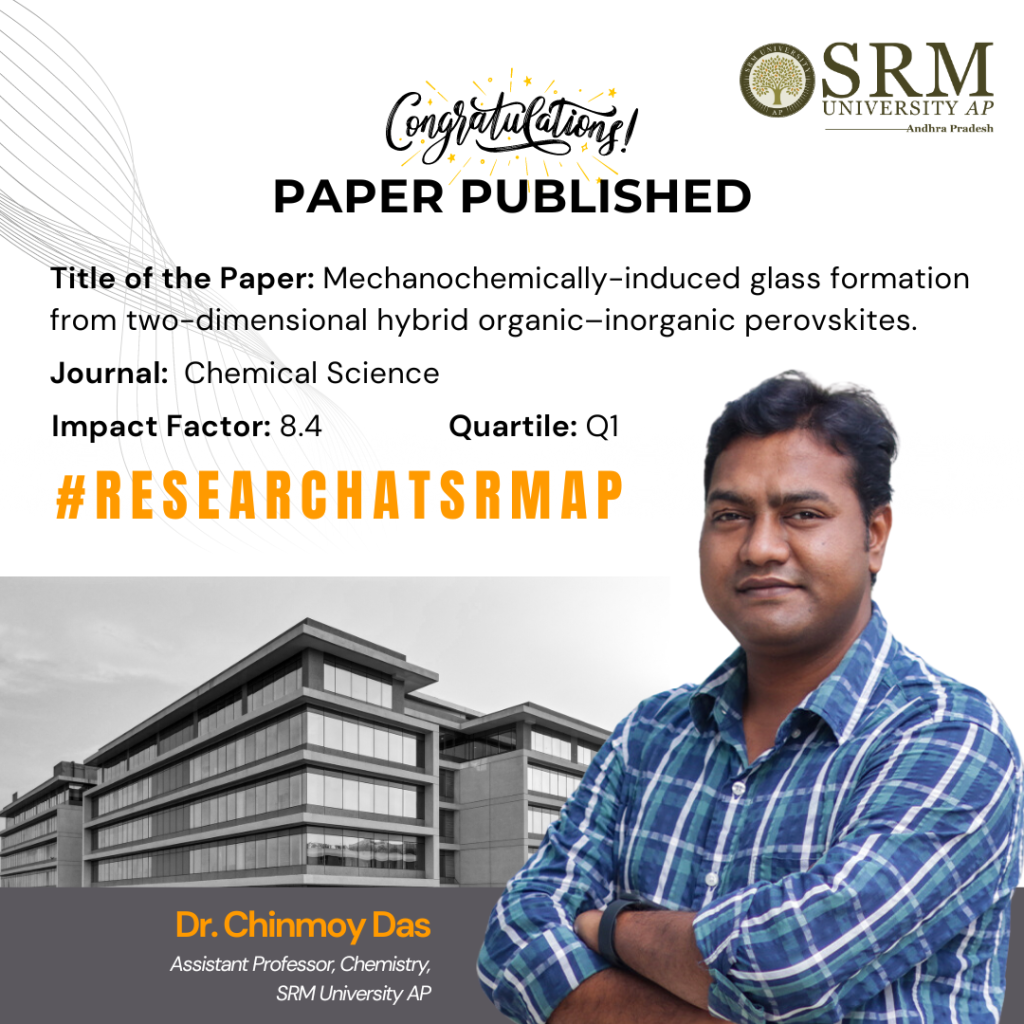
The Department of Chemistry is thrilled to announce the paper “Mechanochemically-induced glass formation from two-dimensional hybrid organic-inorganic perovskites”, published by Dr Chinmoy Das, Assistant Professor in the reputed Q1 Journal Chemical Science with an 8.4 Impact Factor. This groundbreaking research introduces a novel method for transforming crystalline phases into glasses through mechanochemical processes. This environmentally friendly and efficient method opens new doors for manufacturing glasses, revolutionising traditional processes. This remarkable research celebrates this extraordinary blend of chemistry, physics, and innovation!
Abstract
The first mechanochemically-induced hybrid organic-inorganic perovskites (HOIPs) crystal-to-glass transformation was reported as a quick, environmentally friendly, and productive method of making glasses. Within ten minutes of mechanical ball milling, the crystalline phase transformed into the amorphous phase, demonstrating glass transition behaviour as shown by thermal analysis methods. The microstructural evolution of amorphization was studied using time-resolved in situ ball-milling with synchrotron powder diffraction. The results indicated that energy may accumulate as crystal defects because the crystallite size reaches a comminution limit before the amorphization process is finished. The limited short-range order of amorphous HOIPs was discovered through total scattering experiments, and photoluminescence (PL) and ultraviolet-visible (UV-vis) spectroscopy were used to examine their optical characteristics.
Explanation of the research in layperson’s terms
Crystalline inorganic perovskites (general chemical formula is ABX3, where A and B are cations, and X is anion) are generally known for their unique optoelectronic applications, such as solar cells, photodetectors, and LEDs (light emitting diodes). In this research, Dr Das revealed hybrid materials comprised of organic linkers and inorganic nodes, which constitute hybrid organic-inorganic perovskites (HOIPs). The research demonstrated a rapid and environment-friendly (mechanochemically ball milling assisted) synthetic approach to transform the crystalline phase to its non-crystalline/amorphous phase. Interestingly, the amorphous phase of HOIPs showed temperature-dependent glass transition temperature (Tg) at very low temperatures, ~50 C. The structure of the HOIP glasses has been characterised through total-X-ray diffraction studies and pair-distribution functions. The crystalline and glassy HOIPs showed optical properties, which were studied by photoluminescence (PL) and ultraviolet-visible (UV-vis) spectroscopy.
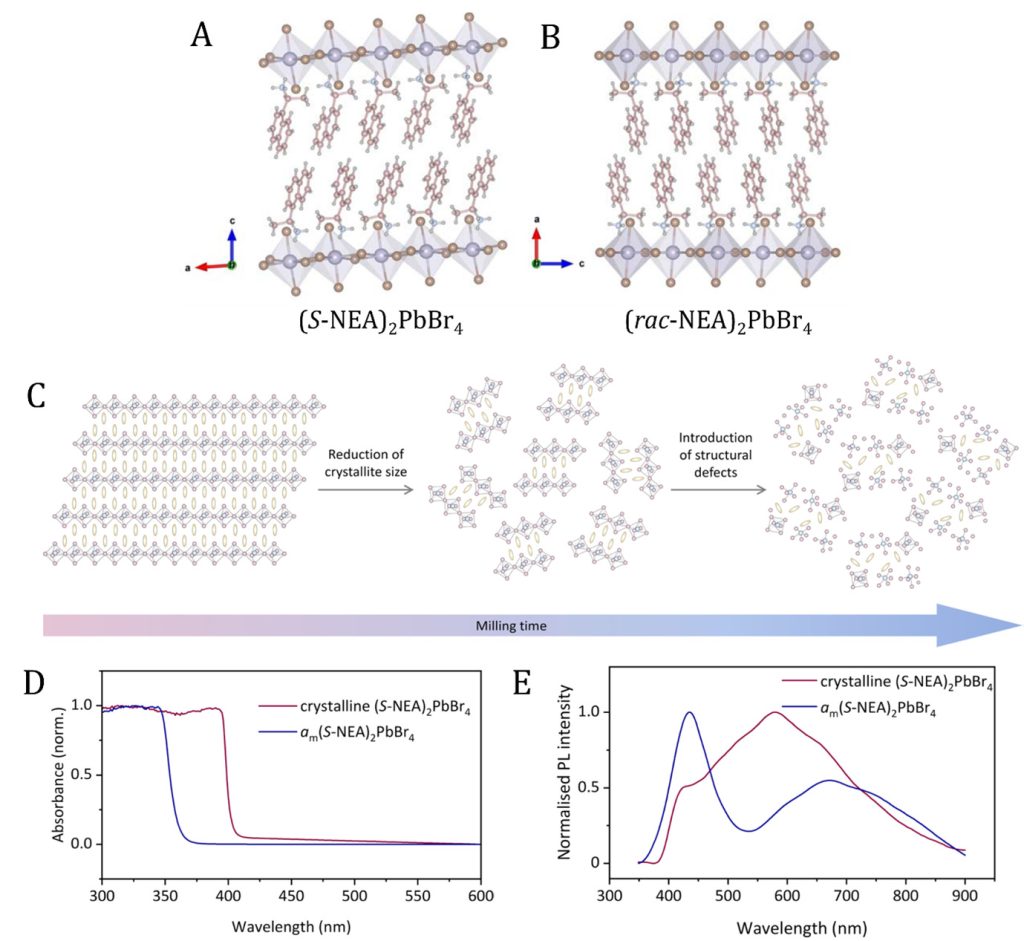
Figure 1. Single crystal structures of (A) (S-NEA)2PbBr4 and (B) (rac-NEA)2PbBr4. Pb, Br, C, N and H atoms are represented by purple, brown, pink, blue, and grey colours, respectively. (C) Schematic illustration of the microstructural evolution on 2D HOIPs upon ball-milling. (D) UV-Vis and (E) photoluminescent properties of crystalline (S-NEA)2PbBr4 (purple) and glassy (S-NEA)2PbBr4 (blue) HOIPs.
Practical implementation/ social implications of your research
Through the mechanochemical approach, we prepared novel hybrid organic-inorganic perovskite (HOIP) glasses within ten minutes, showing the greater feasibility of processing the glass material for industrial implication. On the other hand, we also demonstrated that the HOIP glasses showed photoluminescence properties, which would enable us to fabricate the device for solar cells, photodetectors, LEDs and many more.
Collaborations
- Department of Materials Science and Metallurgy, University of Cambridge, United Kingdom.
The Department of Chemistry has established a research group at SRM University-AP, and the group has started to explore an emergent research area of crystal-glass composite materials towards the applications of atmospheric water harvesting, solid-state electrolytes, photovoltaics, and conversion of gaseous Carbon-dioxide molecules to industrially relevant liquids, such as methanol or ethanol.
Any interested candidate can reach out to Dr Chinmoy for exciting projects.
Continue reading → - Inauguration of NMR Spectrometer Marks a Milestone in SRM University-AP’s Research Capabilities April 10, 2024
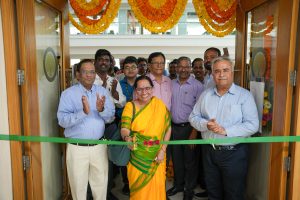 In a significant leap forward for scientific research, SRM University-AP proudly inaugurated the 400 MHz NMR (Nuclear Magnetic Resonance) Spectrometer, procured through the DST-FIST program. This acquisition is a vital component of the broader DST FIST project, which has been awarded to the Department of Chemistry at SRM University- AP with a budget of 2.20 crores.
In a significant leap forward for scientific research, SRM University-AP proudly inaugurated the 400 MHz NMR (Nuclear Magnetic Resonance) Spectrometer, procured through the DST-FIST program. This acquisition is a vital component of the broader DST FIST project, which has been awarded to the Department of Chemistry at SRM University- AP with a budget of 2.20 crores.As part of the project, the Department of Chemistry was recommended a 400 MHz NMR spectrometer by DST, which will play a crucial role in enhancing our expertise and aiding in achieving the proposed objectives. This state-of-the-art equipment is capable of characterising organic, inorganic, and biomolecules, enabling us to conduct comprehensive analyses and advance our understanding of complex chemical systems.
The ceremony, graced by esteemed guests, university dignitaries, faculties, and students, heralded a new era of scientific exploration and innovation. Prof. Lakshmi Kantam Mannepalli, Dr B P Godrej Distinguished Professor, ICT Mumbai, Chief Guest at the event, expressed, ” The inauguration of the 400 MHz NMR Spectrometer heralds a new era of precision and insight in scientific exploration. This instrument will unravel the mysteries of molecular structures and catalyse groundbreaking discoveries in the realm of chemistry and beyond.”
Dr S Mannathan, Associate Professor, Department of Chemistry, extended a warm welcome to the esteemed gathering and offered an insightful demonstration of the equipment’s operation, highlighting its advanced features and functionalities.
Prof. Manoj K Arora, Vice Chancellor, conveyed heartfelt congratulations to the team for this remarkable accomplishment, emphasising the transformative impact the new NMR Spectrometer will have on research and academic pursuits within the Department of Chemistry and beyond.”
Prof D Narayana Rao, Executive Director – Research, SRM Group of Institutions, emphasised, “The addition of this advanced equipment will significantly enhance the research capabilities, opening new avenues for exploration and discovery.”
V S Rao, Advisor, lauded the team for their achievement, stating, “This state-of-the-art equipment embodies our commitment to providing cutting-edge resources for our researchers and fostering a culture of innovation and discovery.”
Dr Pardha Saradhi Maram, Head of the Department of Chemistry, expressed his gratitude to all present and extended heartfelt thanks for their support and encouragement.
The acquisition of the 400 MHz NMR Spectrometer represents a significant advancement in scientific instrumentation, enabling researchers to delve deeper into molecular structures, chemical compositions, and dynamic processes. The Equipment will not only benefit the Department of Chemistry and Physics but also serve as a valuable resource for faculties and students across various disciplines.
The university has already trained 70 to 80 individuals in the operation of this equipment and is planning to organise a workshop for students and faculties from different universities, offering them the opportunity to leverage this advanced technology for their research and academic pursuits.
Continue reading →


